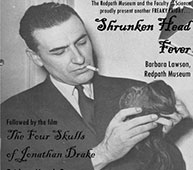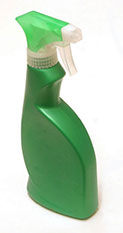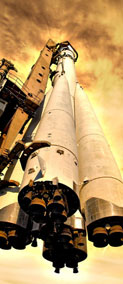Around campus
Calling all headhunters

Courtesy of Freaky Fridays
The March 2 Freaky Fridays lecture will be a mind-expanding seminar on the science of shrunken heads. Barbara Lawson, curator of ethnology at Redpath Museum, will discuss tsantas, the shrunken heads created by Jivaro warriors over a century ago and the fascination they inspire. A screening of the 1959 film
The Four Skulls of Jonathan Drake, an irresistibly campy tale of errant heads and ancient curses, will follow her presentation.
Friday, March 2, 4 p.m., Redpath Museum, 859 Sherbrooke W. Admission: $5 at the door; all proceeds to fund construction of a giant origami pteranodon to be suspended above the museum's dinosaur. For more information, contact Ingrid Birker at 514-398-4086, ext. 4094 or see www.mcgill.ca/science/outreach/freakyfridays.
Hollywood classics
McGill's classics program has organized a unique series of events to coincide with the eagerly anticipated release of 300, a film adaptation of Frank Miller's graphic novel on the battle of Thermopylae. The series, "Sparta–Military, Memory and the Movies," will begin with a trip to the Montreal premiere of the film on Friday, March 9. Next, a roundtable discussion of the movie, ancient tradition and "the Spartan mirage," the idealized reputation of the city, will be held on Wednesday, March 14 in Room 145 of the Arts Building at 4:30 p.m. Then, at 3:30 p.m. on Friday, March 16, Professor John Serrati of John Abbott College will give a public guest lecture titled "Sparta in the Cold War" in Room 265 of the Arts Building.
"Sparta–Military, Memory and the Movies." March 9, 14, 16. All welcome. For more information, contact Hans Beck, or Amanda Lazarus.
Cleaning without carcinogens

Istock photo
On March 8, the McGill Centre for Research and Teaching on Women will host an information session on the little-known health dangers associated with some cosmetics and household cleaners. "The Dirt on Clean: Women's Health and Consumer Products" will be an informal and interactive discussion on avoiding products whose toxic ingredients can negatively affect reproductive health or heighten the risk of developing cancer. Participants are invited to bring products from home to check if they are safe.
Thursday, March 8, 5:30 to 7:30 p.m., McGill Centre for Research and Teaching on Women, 3487 Peel St. Free. For more information, contact Cy-Thea Sand at cy-thea.sand@mcgill.ca, 514-398-3911, ext. 5.
Is it cold in here or did someone just open a can of Bose-Einstein Condensate?
What happens when a gas is cooled to absolute zero? It becomes a Bose-Einstein Condensate, a new doorway into the world of quantum mechanics and the topic of the Anna I. McPherson Lecture in Physics. All the atoms in a Bose-Einstein Condensate start marching in lockstep and form one giant matter wave, a phenomenon predicted by Einstein in 1925, but only realized in 1995 in laboratories at Boulder and at MIT. Since then, many properties of this mysterious form of matter have been revealed. And who better to guide you through the frigid world of frozen gases than Wolfgang Ketterle, MIT
John D. MacArthur Professor of Physics and 2001 Nobel physics laureate. Ketterle's lecture will link basic concepts of quantum mechanics with today's research and discuss the sophisticated techniques used to cool and manipulate matter at ultra-cold nanokelvin temperatures.
Friday, March 2, 3 p.m., Strathcona Anatomy and Dentistry Building, Room M1. Free admission and open to the public. For more information, contact Elizabeth Shearon at 514-398-6490.
The greatest social good
Having recently completed his term as U.N. Secretary-General Kofi Annan's special envoy for HIV/AIDS in Africa, Stephen Lewis will be the guest speaker at the Phyllis Shapiro Memorial Lecture on March 19 at 5:30 p.m. at the Mount Royal Centre, 2200 Mansfield St.
His lecture, Education: The World's Greatest Force for Good, will explore the way in which education throughout the world transforms lives and is perhaps the greatest, unacknowledged instrument for dramatic social change.
March 19, 5:30 p.m., Mount Roay centre, 2200 Mansfield St. Phyllis Shapiro Memorial Lecture.
McGill blasts off

Istock photo
When Canadian astronaut and proud McGill alumnus Dr. Dafydd (Dave) Williams travels in space aboard the Shuttle Endeavor later this summer, he'll be making a fashion statement. Like all Canadian astronauts,
Dr. Williams gets a unique patch on his uniform especially designed to reflect his background and the Canadian content of Mission STS-118. Williams chose to represent McGill on his patch and will be sporting the design submitted by the McGill mystery student who won the Canadian Space Agency Mission STS-118 Patch Design Contest. On Friday, March 2, at 10 a.m., Dr. Williams and the winning designer, whose identity has remained a closely guarded secret, will unveil the patch to the public at a news conference on the mezzanine of the Lorne M. Trottier Information Technology Building. All faculty, students and staff are invited to attend this historic McGill moment.
Friday, March 2, 10 a.m., Lorne M. Trottier Information Technology Building mezzanine. All welcome.

